Russian actor Nikolai Merzlikin (1945-2007) appeared in more than 40 films between 1965 and 2006. He made his most popular films in the late 1960s and early 1970s. In 1983, he was honoured as Artist of the State by the Soviet Union.
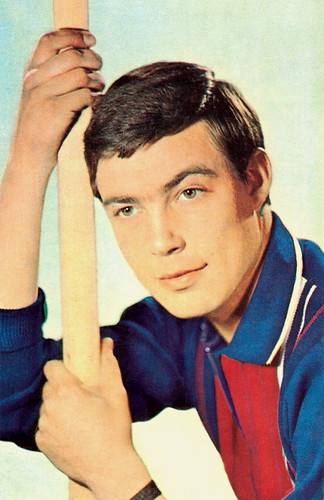
Russian postcard by Izdanije Byuro Propogandy Sovietskogo Kinoiskusstva, no. 2817, 1970. (This postcard was printed in an edition of 165.000 cards. The price was 6 kop.).
Nikolai Nikolayevich Merzlikin (in Russian Николай МЕРЗЛИКИН) was born in the village of Sartyn'ya, Tyumen region, USSR, now Russia, in 1945.
In 1965, while serving in the Army as a signalman, he unexpectedly attracted the attention of film director Tatiana Lioznova. She cast him in Rano Utrom / Early in the Morning (Tatiana Lioznova, 1965). In this Gorky Film production, an orphan girl is forced to face reality when her older brother (Merzlikin), after waiting some time, contemplates marriage.
He started to study at the GITIS (the Russian Academy of Theatre Arts) and was trained by Joseph Moiseyevich Rajewski and Yevgenia Kozyrev. In the meantime, he appeared in the Mosfilm production Chelovyek, kotorovo ya liubliu / The Man I Love (Yuli Garasik, 1966) and in the popular Russian-Polish War drama Zoshya (Mikhail Bogin, 1967), about young Russian soldiers stationed in a Polish village in the summer of 1944.
Merzlikin played supporting parts in another popular romantic drama, Yeshchyo raz pro lyubov / Once Again for Love (Georgi Natanson, 1968), and in the drama Tri dnya Viktora Chernyshova / Three Days of Viktor Chernyshov (Mark Osepyan, 1968) starring Gennadi Korolkov.
That year, he also appeared in the War drama, Daleko Na Zapade / Far in the West (Aleksandr Faintsimmer, 1968), a story of comradeship of soldiers of different nationalities in the French Resistance during 1944. In 1969, he graduated from the GITIS.
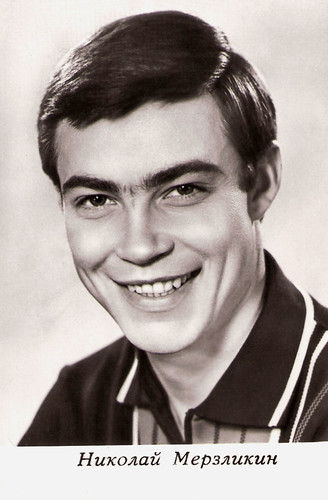
Russian postcard by Izdanije Byuro Propogandy Sovietskogo Kinoiskusstva, no. 7081, 1970. (This postcard was printed in an edition of 100.000 cards. The price was 8 kop.).
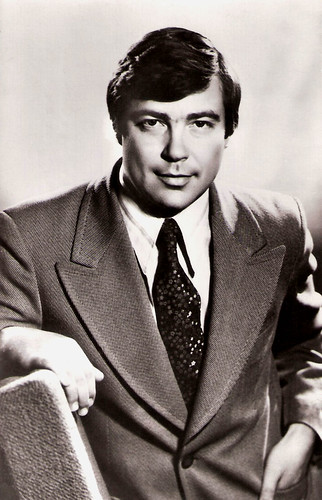
Russian postcard by Izdanije Byuro Propogandy Sovietskogo Kinoiskusstva, no. 1060, 1981. (This postcard was printed in an edition of 50.000 cards. The price was 8 kop.).
In 1971, Nikolai Merzlikin starred in the children’s film V Moskvye, Proezdom / Passing through Moscow (Ilya Gurin, 1971), an anthology film with four episodes. From 1971 on, he worked as an actor at the Studio Theatre in Moscow. In the cinema, he appeared opposite Natalya Varley in Chiornie Sukhari / Black Dried Crust (Herbert Rappaport, 1971), a co-production with the East German DEFA studio about the 'Year of Hunger', 1918, in which young Communists in Moscow sent food to the revolutionary workers in Berlin.
Very popular were the children’s films Chudak iz pyatogo B / The Boy From 5B (Ilya Frez, 1972) and Samyy silnyy / The Strongest (Oleg Nikolayevsky, 1973). In these years, he starred in several films, including Nadezhda / Hope (Mark Donskoy, 1973), Abituriyentka / The Graduate (Aleksei Mishurin, 1973), and Bez prava na oshibku / Without the Right to Error (Aleksandr Faintsimmer, 1974).
In the following years, his film roles became smaller. Merzlikin played a supporting part in the war film Pogovorim, brat / Talk With Me, Brother (Yuri Chulyukin, 1978) and another one in the romantic comedy Ottsy i dedy / Fathers and Grandfathers (Yuri Yegorov, 1982). Although these films were seldom shown in the West, they were quite popular in Eastern Europe.
In 1983, the Soviet Union honoured him as an Artist of the State. He continued to play small parts in little-seen films like the Russian-American coproduction Sokrovishche moey semi / My Family Treasure (Rolfe Kanefsky, Edward Staroselsky, 1993) starring Dee Wallace and Theodore Bikel, and the Polish-Russian romantic drama Istota / Hatch (Andrzej Czarnecki, Krzysztof Zanussi, 2000).
His last film appearance was as a general in the crime film Zharkiy noyabr / A Hot November (Olga Basova, Vladimir Basov Ml., 2006). Nikolai Merzlikin died in 2007 of a heart attack in Moscow, Russia. He was 61.
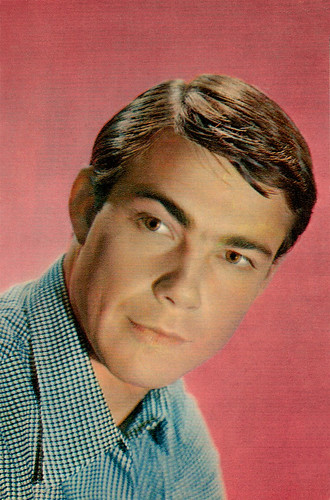
Russian postcard by Izdanije Byuro Propogandy Sovietskogo Kinoiskusstva, no. 230. (This postcard was printed in an edition of 250.000 cards. The price was 6 kop.).
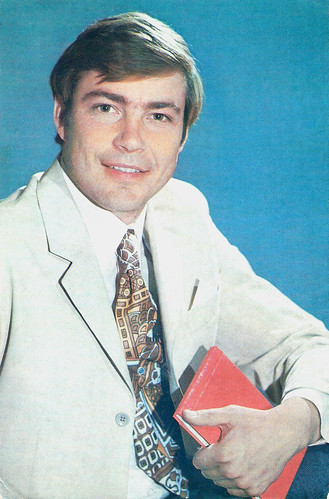
Russian postcard by Izdanije Byuro Propogandy Sovietskogo Kinoiskusstva, no. 558. Photo: G. Ter-Ovanesova. (This postcard was printed in an edition of 300.000 cards. The price was 5 kop.).
Sources: BFI (Page now defunct), OFDB (German - Page now defunct), Peoples.ru (Now defunct), and IMDb.
This page was last updated on 7 August 2025.

Russian postcard by Izdanije Byuro Propogandy Sovietskogo Kinoiskusstva, no. 2817, 1970. (This postcard was printed in an edition of 165.000 cards. The price was 6 kop.).
Signalman
Nikolai Nikolayevich Merzlikin (in Russian Николай МЕРЗЛИКИН) was born in the village of Sartyn'ya, Tyumen region, USSR, now Russia, in 1945.
In 1965, while serving in the Army as a signalman, he unexpectedly attracted the attention of film director Tatiana Lioznova. She cast him in Rano Utrom / Early in the Morning (Tatiana Lioznova, 1965). In this Gorky Film production, an orphan girl is forced to face reality when her older brother (Merzlikin), after waiting some time, contemplates marriage.
He started to study at the GITIS (the Russian Academy of Theatre Arts) and was trained by Joseph Moiseyevich Rajewski and Yevgenia Kozyrev. In the meantime, he appeared in the Mosfilm production Chelovyek, kotorovo ya liubliu / The Man I Love (Yuli Garasik, 1966) and in the popular Russian-Polish War drama Zoshya (Mikhail Bogin, 1967), about young Russian soldiers stationed in a Polish village in the summer of 1944.
Merzlikin played supporting parts in another popular romantic drama, Yeshchyo raz pro lyubov / Once Again for Love (Georgi Natanson, 1968), and in the drama Tri dnya Viktora Chernyshova / Three Days of Viktor Chernyshov (Mark Osepyan, 1968) starring Gennadi Korolkov.
That year, he also appeared in the War drama, Daleko Na Zapade / Far in the West (Aleksandr Faintsimmer, 1968), a story of comradeship of soldiers of different nationalities in the French Resistance during 1944. In 1969, he graduated from the GITIS.

Russian postcard by Izdanije Byuro Propogandy Sovietskogo Kinoiskusstva, no. 7081, 1970. (This postcard was printed in an edition of 100.000 cards. The price was 8 kop.).

Russian postcard by Izdanije Byuro Propogandy Sovietskogo Kinoiskusstva, no. 1060, 1981. (This postcard was printed in an edition of 50.000 cards. The price was 8 kop.).
The year of hunger
In 1971, Nikolai Merzlikin starred in the children’s film V Moskvye, Proezdom / Passing through Moscow (Ilya Gurin, 1971), an anthology film with four episodes. From 1971 on, he worked as an actor at the Studio Theatre in Moscow. In the cinema, he appeared opposite Natalya Varley in Chiornie Sukhari / Black Dried Crust (Herbert Rappaport, 1971), a co-production with the East German DEFA studio about the 'Year of Hunger', 1918, in which young Communists in Moscow sent food to the revolutionary workers in Berlin.
Very popular were the children’s films Chudak iz pyatogo B / The Boy From 5B (Ilya Frez, 1972) and Samyy silnyy / The Strongest (Oleg Nikolayevsky, 1973). In these years, he starred in several films, including Nadezhda / Hope (Mark Donskoy, 1973), Abituriyentka / The Graduate (Aleksei Mishurin, 1973), and Bez prava na oshibku / Without the Right to Error (Aleksandr Faintsimmer, 1974).
In the following years, his film roles became smaller. Merzlikin played a supporting part in the war film Pogovorim, brat / Talk With Me, Brother (Yuri Chulyukin, 1978) and another one in the romantic comedy Ottsy i dedy / Fathers and Grandfathers (Yuri Yegorov, 1982). Although these films were seldom shown in the West, they were quite popular in Eastern Europe.
In 1983, the Soviet Union honoured him as an Artist of the State. He continued to play small parts in little-seen films like the Russian-American coproduction Sokrovishche moey semi / My Family Treasure (Rolfe Kanefsky, Edward Staroselsky, 1993) starring Dee Wallace and Theodore Bikel, and the Polish-Russian romantic drama Istota / Hatch (Andrzej Czarnecki, Krzysztof Zanussi, 2000).
His last film appearance was as a general in the crime film Zharkiy noyabr / A Hot November (Olga Basova, Vladimir Basov Ml., 2006). Nikolai Merzlikin died in 2007 of a heart attack in Moscow, Russia. He was 61.

Russian postcard by Izdanije Byuro Propogandy Sovietskogo Kinoiskusstva, no. 230. (This postcard was printed in an edition of 250.000 cards. The price was 6 kop.).

Russian postcard by Izdanije Byuro Propogandy Sovietskogo Kinoiskusstva, no. 558. Photo: G. Ter-Ovanesova. (This postcard was printed in an edition of 300.000 cards. The price was 5 kop.).
Sources: BFI (Page now defunct), OFDB (German - Page now defunct), Peoples.ru (Now defunct), and IMDb.
This page was last updated on 7 August 2025.
No comments:
Post a Comment